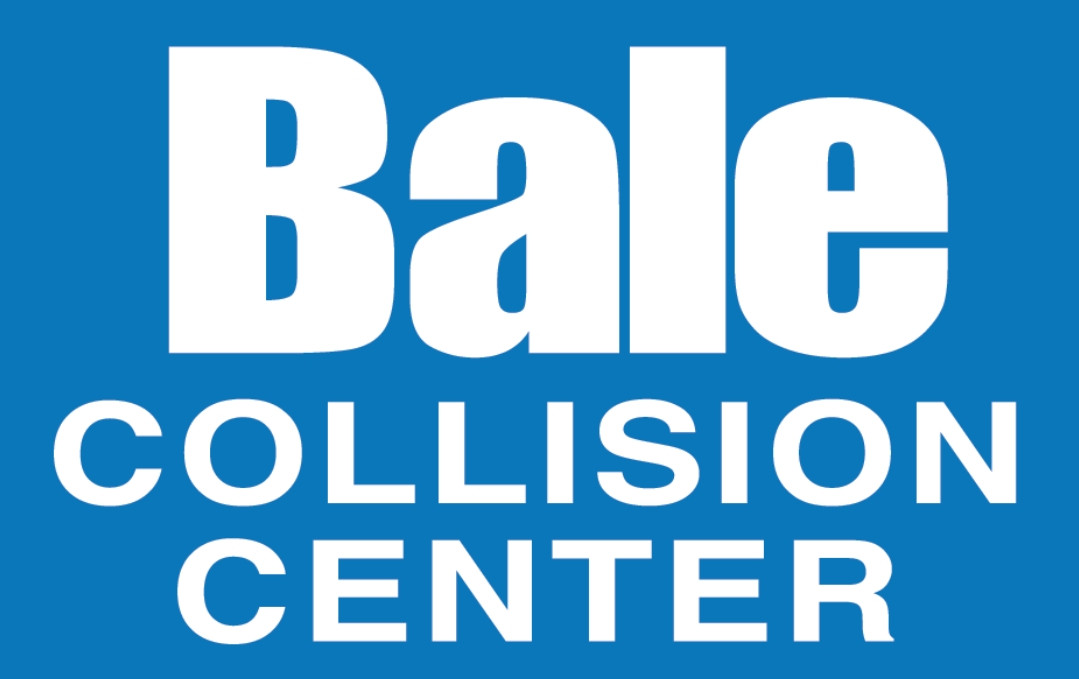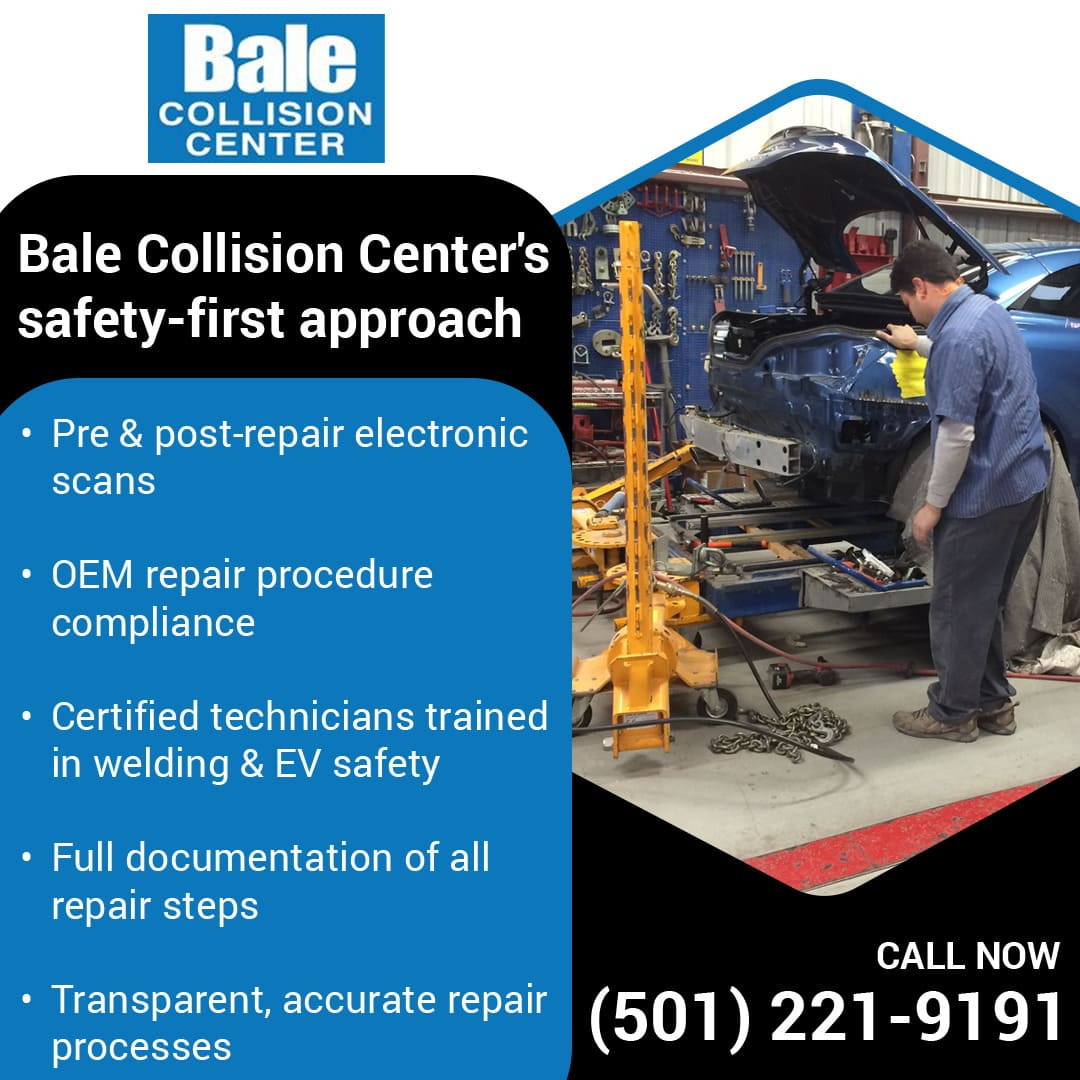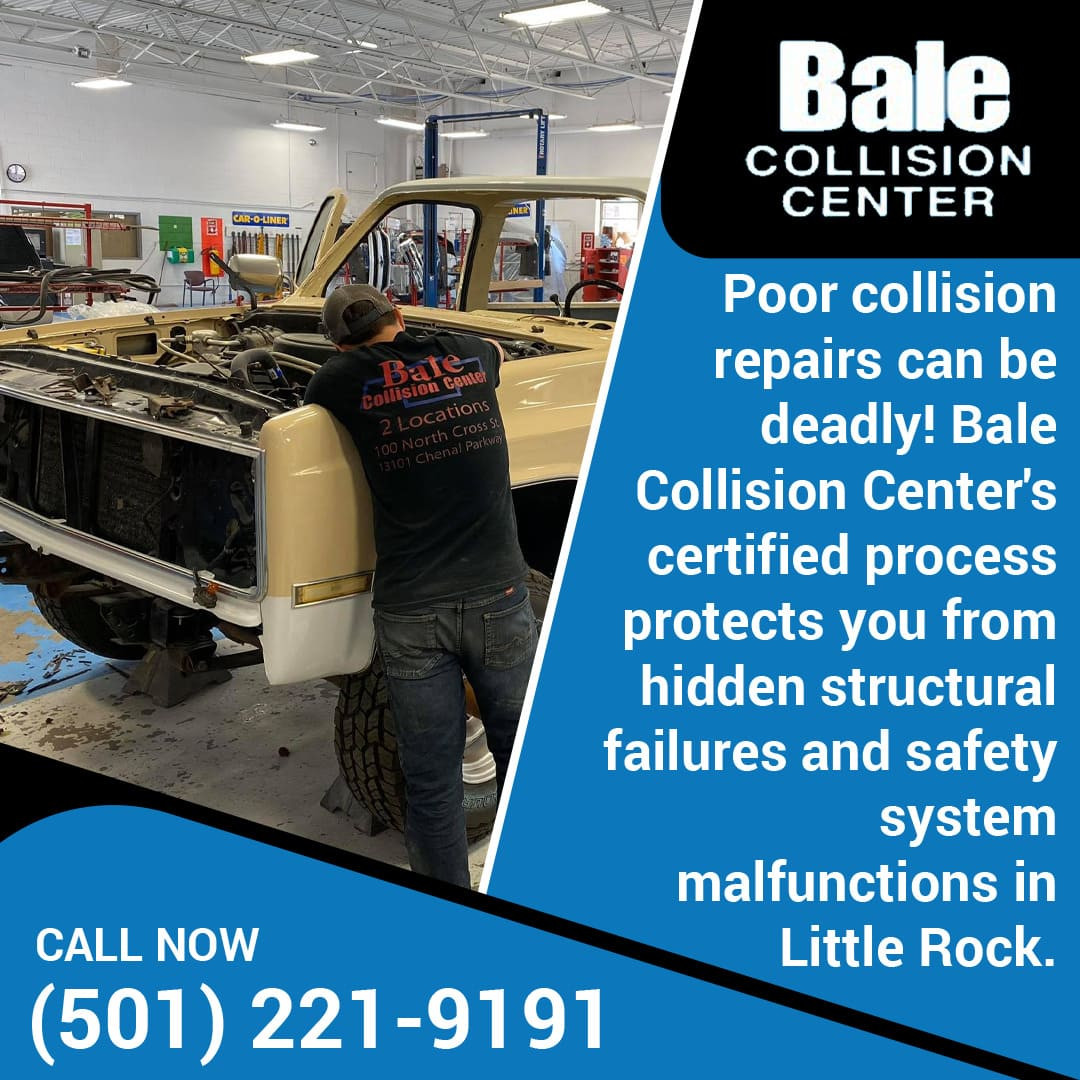How Poor Collision Repairs Can Compromise Your Safety: What Bale Collision Center Does Differently
Little Rock, United States - September 29, 2025 / Bale Collision Center (Chenal) /
Little Rock, AR - Bale Collision Center (Chenal) is raising awareness among Little Rock drivers about the dangerous consequences of poor auto collision repair. The trusted collision center, backed by over 70 years of experience and I-CAR Gold Class certification, emphasizes that cutting corners during repairs can lead to hidden structural weaknesses, malfunctioning safety systems, and serious long-term hazards that compromise driver and passenger protection.
Unsafe Repairs Create Hidden Safety Threats
Not all car collision repair is performed with the same level of care or compliance. When repair shops lack certified training, specialized tools, or access to manufacturer specifications, their work may look fine on the surface, but fail in a moment of critical need. Substandard repairs often go undetected until they are tested under stress, such as during a crash, sudden stop, or emergency maneuver.
Bale Collision Center points to high-profile cases, like a 2017 lawsuit in Texas resulting in $31.5 million in damages after improper structural repairs led to catastrophic injuries, as a warning. These incidents highlight how safety failures caused by incorrect auto collision repair can turn routine accidents into life-threatening events.
Structural Compromise Through Improper Methods
Modern vehicles are engineered with crumple zones, energy redirection paths, and high-strength materials that must be restored with precision. Improper repairs, like incorrect welds, misaligned joints, or using parts made from the wrong materials, disrupt these designs. Instead of absorbing crash forces and keeping passengers safe, the vehicle’s frame may fold or transfer impact energy to the cabin.
Collision centers that skip essential steps or substitute original parts with cheap, untested alternatives often weaken the vehicle’s overall crash integrity. Even rushed or poorly executed paint jobs can allow rust to form around sensor mounts, airbag supports, and belt anchor points, undermining safety over time.
Electronic Safety System Failures
Today’s vehicles are equipped with integrated electronic safety systems that require exact calibration after repairs. These systems include Advanced Driver Assistance Systems (ADAS) such as lane-keeping assist, forward collision warning, and blind spot detection. If sensors, cameras, or modules are not reinstalled and recalibrated according to OEM instructions, the systems may fail to function properly.
For example, a misaligned radar sensor can misjudge distance, causing automatic braking to engage late or not at all. A blocked lane camera might delay or confuse the lane departure warning system.
Bale Collision Center warns that these failures may not be immediately visible, but they put vehicle occupants at risk every time the car is in motion. Electric and hybrid vehicles require even more caution due to high-voltage systems that, when mishandled, can disable safety features or create electrical hazards.
Importance of OEM-Certified Collision Repair
Manufacturers design vehicles with very specific repair procedures to restore original safety performance. These OEM guidelines are developed through crash tests, engineering simulations, and rigorous material testing. They include exact torque settings, weld patterns, material usage, and calibration methods, none of which can be replaced by guesswork.
Certified collision repair follows these procedures down to the detail. Using unapproved shortcuts or generic repair techniques may result in a vehicle that passes a visual check but fails in an accident. Bale Collision Center stresses that OEM compliance is the reliable way to ensure safety systems work as intended.
Warning Signs of Unsafe Repair Shops
Drivers should pay attention to several red flags when evaluating a collision repair provider:
- Unusually low repair quotes may indicate plans to cut corners, skip calibrations, or use substandard parts.
- Lack of diagnostic equipment means the shop cannot scan for electronic faults or calibrate ADAS systems.
- Overpromised timelines signal rushed work, often at the expense of structural integrity or proper drying and curing stages.
Bale Collision Center’s Safety-First Approach
As a leading provider of collision repair in Chenal Parkway, Little Rock, AR, Bale Collision Center offers a certified, safety-first process that includes:
- Pre- and post-repair electronic scans to verify system health
- OEM repair procedure access and compliance
- Certified collision repair technicians trained in welding, multi-material repair, and electric vehicle safety
- Full documentation of all repair steps, calibrations, and quality checks
Every car collision repair project is completed with transparency, accuracy, and a commitment to preserving the vehicle’s crashworthiness and electronic reliability.
Schedule Certified Collision Repair in Chenal, Little Rock, AR
When safety is at stake, choosing a certified collision center matters. Bale Collision Center combines decades of experience, advanced diagnostic technology, and OEM-backed methods to ensure that every repair protects you and your family. For dependable certified collision repair in Chenal Parkway, Little Rock, AR, contact Bale Collision Center. Call (501) 221-9191 or email bccwlr@baleautomotive.com to schedule your free repair estimate today.

Contact Information:
Bale Collision Center (Chenal)
13101 Chenal Parkway
Little Rock, AR 72211
United States
Jason Spiller
(501) 221-9191
https://balecollision.com/
Original Source: https://balecollision.com/collision-repair/how-poor-collision-repairs-can-compromise-your-safety-what-bale-collision-center-does-differently/



